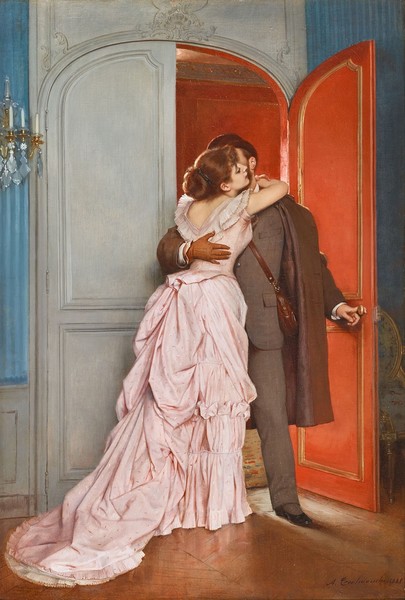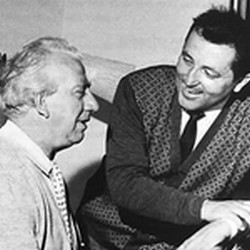
Cançons que no em fan ni fred ni calor. Que no posaria en una llista de cançons que no m'agraden (llista que, en públic, té un únic ítem), però no diria tampoc que m'agraden. Cançons que, quan les veig en el programa d'un recital, em fan mandra. Sí, és això: cançons que em fan mandra. Perquè, no és tant que no em facin ni fred ni calor, sinó que la sensació depèn del dia. I això vol dir que depèn de mi i de com estigui de receptiva, dels intèrprets, del moment del recital en què s'interpreti... És un experiment interessant que faig amb relativa freqüència si us plau per força, perquè les quatre o cinc cançons que tinc ara al cap són entre les més conegudes dels seus autors.
Almenys sé què em provoca els dubtes: l'excés de sucre. No sóc gaire de dolços i, en general, m'embafen de seguida, i amb les cançons em passa el mateix si hi trobo massa sucre. "Exemples, exemples, en volem exemples!" Esteu pensant això, oi? Perquè sóc conscient que el concepte "massa sucre" és molt relatiu. Doncs som-hi, aquí en teniu un: Es muss ein Wunderbares sein, de Franz Liszt. Que, ensucrat o no, no només és un dels seus lieder més famosos avui dia sinó també a la seva època. El va compondre el 1852, durant la seva etapa a Weimar, on era el hofkapellmeister (a efectes pràctics, el director musical de la cort) de l'arxiduc Karl Friedrich de Saxònia-Weimar-Eisenach, molt amant de les arts i mecenes i protector d'un bon grapat d'artistes. Liszt havia arribat a Weimar el 1848 i, precisament en aquell moment, no componia gaires cançons perquè estava centrat sobretot en la direcció i la composició dels seus poemes simfònics. Però vet aquí que la princesa Augusta, germana de l'arxiduc, li va suggerir al compositor el text per a fer-ne una cançó, i difícilment s'hi podia negar.
Els versos eren part d'Amaranth, un poema entre líric i èpic d'Oskar von Redwitz que va tenir molt d'èxit quan es va publicar el 1849; tant, que el 1851 ja anaven per la vuitena edició. El poema se situa en una Edat Mitjana idealitzada, on no hi falten les llegendes, la religiositat i l'amor cortès. El protagonista és el cavaller Walther (un nom que remet a Walther von der Vogelweide, el trobador alemany més important), que en un viatge cap a Itàlia fa estada a la propietat d'un noble la filla del qual, Amaranth, s'enamora d'ell. Però, ai las! Walther està compromès i viatja per trobar-se amb la seva promesa Ghismonda, així que Amaranth pateix el seu amor en silenci. Quan el cavaller es troba amb Ghismonda, descobreix amb dolor que la donzella és un esperit lliure que no creu en Déu, sinó que s'inclina cap al panteisme. Walther prova de tornar-la a la fe, però no se'n surt, i es veu forçat a trencar el compromís. De tornada cap a casa, s'atura a la mateixa propietat i, ara sí, tot va com una seda: Amaranth i Walther es casen, són feliços i mengen anissos. Si esteu pensant que no és una història gaire estimulant, jo també ho penso, però igualment penso que Amaranth té molts punts en comú amb Tannhäuser, una òpera (composta el 1845) que m'emociona tants cops com l'escolto.
El poema de Redwitz està dividit en quatre cicles, i cadascun d'ells en nombrosos capítols; els versos d'Es muss ein Wunderbares sein els trobem cap al final del segon cicle, Amaranth; són les dues primeres estrofes del capítol Amaranths stille Lieder [Les cançons callades d'Amaranth], on la jove canta un amor que en aquells moments és impossible. Com us deia, Liszt la va escriure a petició de la princesa Alexandra, segons expliquen, entre l'hora de dinar i la de sopar. Molts anys després, el compositor la va posar com a exemple del que havia de ser una cançó: una línia de cant senzilla i un acompanyament també senzill, que subratlla a penes algunes paraules. En aquells últims anys de la seva vida, va revisar molts dels seus lieder per a simplificar-los (en vam parlar aquí, amb relació als Tre sonetti di Petrarca), però amb Es muss ein Wunderbares sein ja havia fet una cançó ideal segons el criteri que el guiaria trenta anys després.
Sóc conscient que és una cançó bonica, no és estrany que sigui tan coneguda. Però té un punt extra de dolçor que, com us deia al començament, m'embafa, i fa que estigui en els meus llimbs de cançons. Fins que, fa uns mesos, vaig escoltar la versió que comparteixo avui, la de Jonas Kaufmann i Helmut Deutsch i em vaig sorprendre a mi mateixa aturant el reproductor i repetint-la, de tant com m'havia agradat. Què hi havia, de diferent? Perquè no es pot dir que no l'hagi escoltada per grans cantants, n'hi ha un munt d'enregistraments. Després de donar-hi unes quantes voltes, arribo a la conclusió que Kaufmann té una connexió especial amb aquest tipus de cançons, així com altres cantants la tenen amb les peces més contemplatives o més narratives, i aconsegueix sovint que sonin naturals; també penso que Deutsch hi fa de contrapunt, com quan fas un pastís i hi tires un pessic de sal perquè quedi amb el punt perfecte de dolç. Si més no, aquesta és la sensació que tinc quan escolto la seva interpretació d'Es muss ein Wunderbares sein.
Cançons que fan mandra, havia començat per aquí. Teniu cançons que us fan mandra, que no sabeu si us agraden o no, que potser depèn del dia? Les voleu compartir?
Es muss ein Wunderbares sein
Ums Lieben zweier Seelen,
Sich schliessen ganz einander ein,
Sich nie ein Wort verhehlen,
Und Freud und Leid und Glück und Not
So mit einander tragen;
Vom ersten Kuss bis in den Tod
Sich nur von Liebe sagen.
Ha de ser meravellós
per a dues ànimes estimar-se,
lliurar-se absolutament l'un a l'altre,
no ocultar mai un mot.
I alegria i sofriment, i joia i pena
passar plegats;
des del primer petó fins a la mort
només parlar d'amor.















